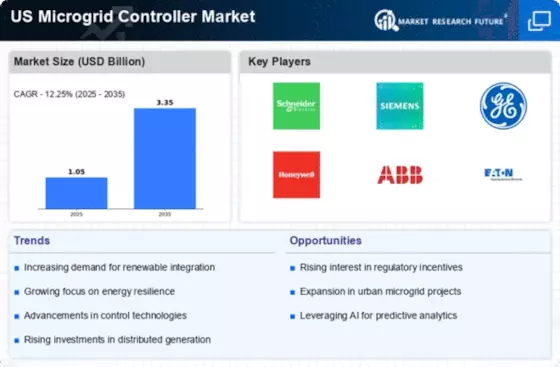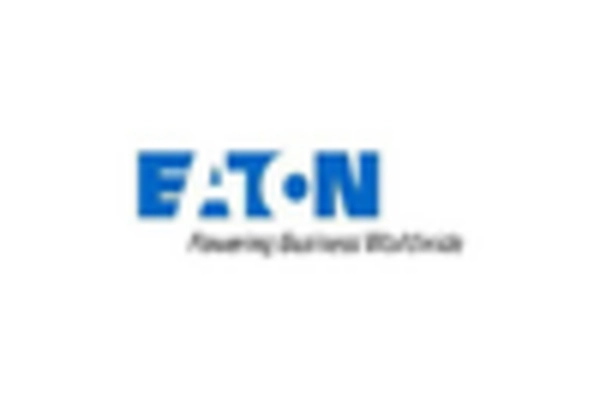Supportive Policy Framework and Incentives
The US Microgrid Controller Market is bolstered by a supportive policy framework and various incentives aimed at promoting microgrid development. Federal and state governments are implementing policies that encourage the deployment of microgrids, including tax credits, grants, and regulatory support. These incentives are designed to lower the financial barriers associated with microgrid implementation, making it more attractive for investors and developers. As a result, the market for microgrid controllers is likely to see increased activity, as stakeholders capitalize on these favorable conditions. The alignment of policy initiatives with market needs suggests a robust growth trajectory for the microgrid controller sector in the US.
Technological Advancements in Microgrid Systems
Technological innovations are significantly influencing the US Microgrid Controller Market. The integration of advanced control algorithms, artificial intelligence, and machine learning into microgrid systems enhances their efficiency and reliability. These technologies enable real-time monitoring and optimization of energy resources, which is essential for managing the complexities of modern energy demands. As a result, the market is witnessing an influx of sophisticated microgrid controllers that can seamlessly integrate various energy sources, including solar, wind, and battery storage. This trend is expected to drive market growth, as stakeholders increasingly recognize the value of adopting cutting-edge technologies to improve energy management and operational efficiency.
Growing Demand for Decentralized Energy Solutions
The US Microgrid Controller Market is experiencing a notable shift towards decentralized energy solutions. This trend is driven by the increasing need for localized energy generation and consumption, which enhances energy security and reduces transmission losses. As communities seek to become more self-sufficient, the demand for microgrid controllers is expected to rise. According to recent data, the market for microgrid controllers in the US is projected to grow at a compound annual growth rate of approximately 12% over the next five years. This growth is indicative of a broader movement towards energy independence, where microgrids play a crucial role in integrating renewable energy sources and providing reliable power during outages.
Increased Investment in Smart Grid Infrastructure
The US Microgrid Controller Market is benefiting from substantial investments in smart grid infrastructure. Federal and state governments are prioritizing the modernization of the electrical grid to enhance its resilience and efficiency. This investment is reflected in various initiatives aimed at integrating microgrids into the existing grid framework. For instance, the Department of Energy has allocated significant funding for projects that promote the development of microgrid technologies. As a result, the market for microgrid controllers is likely to expand, driven by the need for advanced control systems that can manage distributed energy resources effectively. This trend underscores the importance of microgrids in achieving a more reliable and sustainable energy future.
Rising Awareness of Climate Change and Sustainability
The growing awareness of climate change and sustainability issues is a key driver for the US Microgrid Controller Market. As environmental concerns become more pronounced, there is an increasing push for cleaner energy solutions. Microgrids, which facilitate the integration of renewable energy sources, are seen as a viable solution to reduce carbon footprints. This shift is supported by various state-level policies promoting renewable energy adoption and energy efficiency. Consequently, the demand for microgrid controllers is expected to rise as organizations and communities seek to implement sustainable energy practices. The alignment of microgrid technologies with sustainability goals positions the market for significant growth in the coming years.















